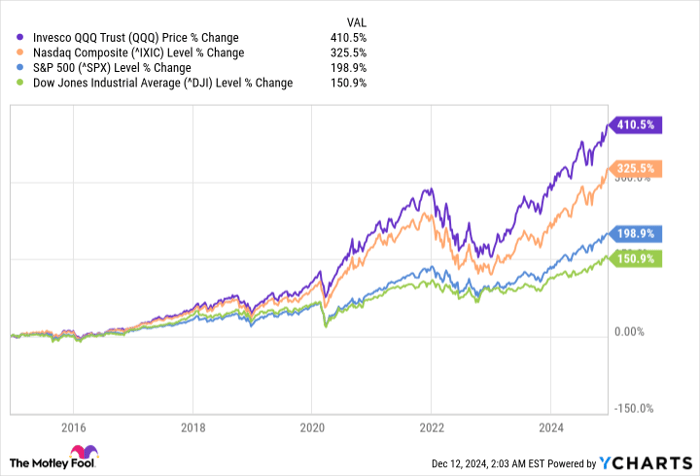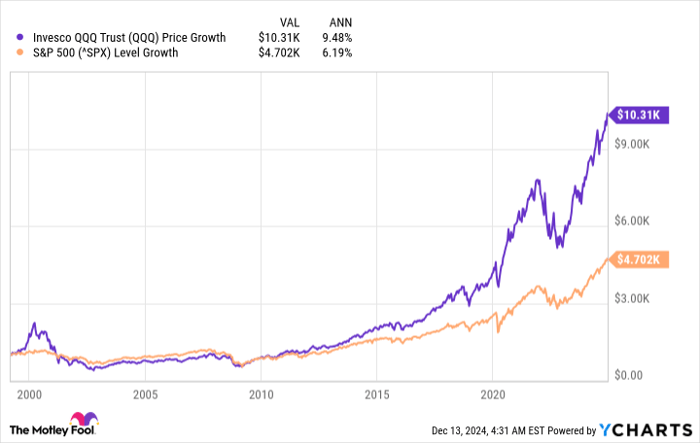When people refer to investing in the Nasdaq, it could mean a few different things.
For some, it means investing in the Nasdaq Composite, one of the U.S. stock market's main three indexes that includes virtually every stock on the Nasdaq (NASDAQ: NDAQ) stock exchange. For others, it means investing in the Nasdaq-100, a subset of the Nasdaq Composite, tracking the 100 largest non-financial stocks in the index.
Neither option is outright better than the other; it's all about preference. The Nasdaq Composite is much larger and more diversified (over 2,500 companies), while the Nasdaq-100 is concentrated in the biggest names.
Looking ahead to the new year, a great option for investors is a Nasdaq-100 exchange-traded fund (ETF), such as the Invesco QQQ Trust (NASDAQ: QQQ). It's one of the stock market's most popular ETFs, and it has delivered excellent returns going back many years.
Data by YCharts.
There are many growth opportunities for the ETF's top holdings
This ETF is market-cap-weighted, so larger companies make up more of the fund than smaller ones. This has led to a handful of megacap tech stocks leading the charge. Below are the ETF's top 10 holdings:
| Company | Percentage of the ETF |
|---|---|
| Apple | 8.96% |
| Nvidia | 7.88% |
| Microsoft | 7.83% |
| Amazon | 5.62% |
| Meta Platforms | 5.12% |
| Broadcom | 4.89% |
| Tesla | 4.61% |
| Costco Wholesale | 2.70% |
| Alphabet (Class A) | 2.58% |
| Alphabet (Class C) | 2.48% |
Data source: Invesco. Percentages as of Dec. 10.
With 10 companies making up over 52% of the ETF, it's far from the diversification poster child. However, these companies have great growth prospects heading into 2025 (and beyond). It all begins with a few megatrends with lots of momentum: artificial intelligence (AI), cloud computing, and electric vehicles (EV).
AI may not be an industry in itself, but it seems to be well on the way to transforming many industries. Between graphics processing units (GPUs), data centers, semiconductors, machine learning, and other tools needed to train AI, the companies listed above are at the forefront of that charge.
Cloud computing remains in the early stages of adoption, but Amazon, Microsoft, and Alphabet currently lead the market with 31%, 20%, and 11% market shares, respectively.
The global EV market was valued at just over $500 billion in 2023 and is expected to reach nearly $1.9 trillion by 2032, representing a compound annual growth rate of just under 14%. While Tesla is the only EV maker in the top 10, it relies on others for hardware and software components.
This ETF has a history of market-beating performance
The Invesco QQQ Trust has been on a roll since it hit the stock market in Mar. 1999. In those 25 years, it has returned over 930% (as of Dec. 12) and averaged around 9.5% annual returns -- both figures beat out the S&P 500. Every $1,000 invested in the ETF from its inception would be worth over $10,300 now.
Data by YCharts.
You can't use historical performance to predict future performance, but it's encouraging knowing the ETF has held its own through some rough periods in the market, including the dot-com bubble burst, the Great Recession, and COVID-19 pandemic.
It's also encouraging to know you'll be able to keep many of your gains to yourself. This ETF's expense ratio is 0.2%, meaning you'll pay $2 for every $1,000 invested annually. It's not as cheap as some S&P 500 ETFs (like this Vanguard option at 0.03%), but it remains reasonable overall.
The cost might not be the first detail you consider when choosing an ETF, but slight differences could add up to thousands of dollars over the long haul. This ETF is a relatively cheap option with proven results and huge growth opportunities ahead for its core holdings.
Should you invest $1,000 in Invesco QQQ Trust right now?
Before you buy stock in Invesco QQQ Trust, consider this:
The Motley Fool Stock Advisor analyst team just identified what they believe are the 10 best stocks for investors to buy now… and Invesco QQQ Trust wasn’t one of them. The 10 stocks that made the cut could produce monster returns in the coming years.
Consider when Nvidia made this list on April 15, 2005... if you invested $1,000 at the time of our recommendation, you’d have $822,755!*
Stock Advisor provides investors with an easy-to-follow blueprint for success, including guidance on building a portfolio, regular updates from analysts, and two new stock picks each month. The Stock Advisor service has more than quadrupled the return of S&P 500 since 2002*.
*Stock Advisor returns as of December 9, 2024
John Mackey, former CEO of Whole Foods Market, an Amazon subsidiary, is a member of The Motley Fool’s board of directors. Suzanne Frey, an executive at Alphabet, is a member of The Motley Fool’s board of directors. Randi Zuckerberg, a former director of market development and spokeswoman for Facebook and sister to Meta Platforms CEO Mark Zuckerberg, is a member of The Motley Fool's board of directors. Stefon Walters has positions in Apple and Microsoft. The Motley Fool has positions in and recommends Alphabet, Amazon, Apple, Costco Wholesale, Meta Platforms, Microsoft, Nvidia, and Tesla. The Motley Fool recommends Broadcom and Nasdaq and recommends the following options: long January 2026 $395 calls on Microsoft and short January 2026 $405 calls on Microsoft. The Motley Fool has a disclosure policy.
The views and opinions expressed herein are the views and opinions of the author and do not necessarily reflect those of Nasdaq, Inc.




